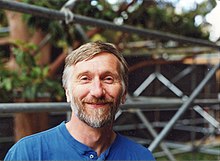David Aldous | |
|---|---|
 Aldous in 1999 | |
| Born | 13 July 1952 |
| Nationality | British, American |
| Alma mater | University of Cambridge |
| Awards | Loève Prize (1993) Rollo Davidson Prize (1980) |
| Scientific career | |
| Fields | Mathematics |
| Institutions | University of California, Berkeley |
| Doctoral advisor | David J. H. Garling |
David John Aldous FRS (born 13 July 1952) is a mathematician known for his research on probability theory and its applications, in particular in topics such as exchangeability, weak convergence, Markov chain mixing times, the continuum random tree and stochastic coalescence. He entered St. John's College, Cambridge, in 1970 and received his Ph.D. at the University of Cambridge in 1977 under his advisor, D. J. H. Garling.[1] Aldous was on the faculty at University of California, Berkeley from 1979 until his retirement in 2018.[2][3]
He was awarded the Rollo Davidson Prize in 1980, the Loève Prize in 1993,[4] and was elected a Fellow of the Royal Society in 1994.[5] In 2004, Aldous was elected a Fellow of the American Academy of Arts and Sciences.[6] From 2004 to 2010, Aldous was an Andrew Dickson White Professor-at-Large at Cornell University.[7] He was an invited speaker at the International Congress of Mathematicians (ICM) in 1998 in Berlin[8] and a plenary speaker at the ICM in 2010 in Hyderabad.[9] In 2012 he became a fellow of the American Mathematical Society.[10] He discovered (independently from Andrei Broder) an algorithm for generating a uniform spanning tree of a given graph.
- ^ David Aldous at the Mathematics Genealogy Project
- ^ "Professor Aldous Starts a New Chapter: Retirement" (PDF). Archived (PDF) from the original on 21 March 2023. Retrieved 14 February 2023.
- ^ "David Aldous's Home Page". Archived from the original on 15 January 2023. Retrieved 14 February 2023.
- ^ "The Loeve Prize". Archived from the original on 9 August 2020. Retrieved 10 January 2020.
- ^ "David Aldous". Royal Society. Archived from the original on 26 January 2020. Retrieved 10 January 2020.
- ^ "Members of the American Academy Listed by election year, 2000-2019" (PDF). American Academy of Arts and Sciences. Archived (PDF) from the original on 18 October 2019. Retrieved 10 January 2020.
- ^ "All Professors at Large 1965 to 2025". Andrew D. White Professors-at-Large. Archived from the original on 15 June 2018. Retrieved 11 November 2019.
- ^ Aldous, David J. (1998). "Stochastic coalescence". Doc. Math. (Bielefeld) Extra Vol. ICM Berlin, 1998, vol. III. pp. 205–211. Archived from the original on 24 July 2020. Retrieved 19 November 2023.
- ^ Aldous, David J. (2010). "Exchangeability and continuum limits of discrete random structures". Proceedings of the International Congress of Mathematicians 2010 Hyderabad. Vol. I. World Scientific. pp. 141–153. ISBN 9789814462938. Archived from the original on 19 November 2023. Retrieved 19 November 2023.
- ^ List of Fellows of the American Mathematical Society Archived 5 December 2012 at archive.today, retrieved 3 November 2012.